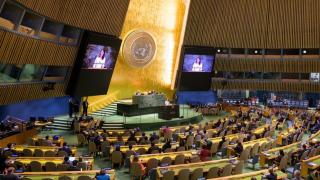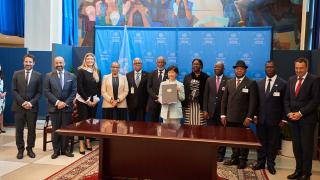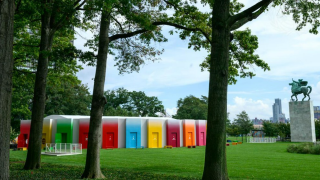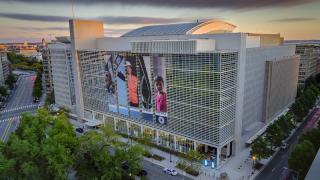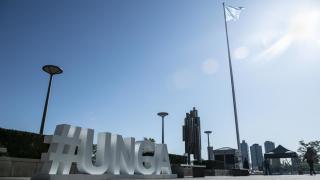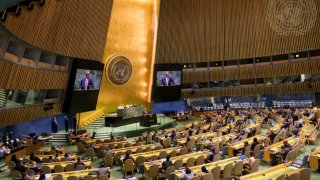
Monday 18 September marks the start of the UN General Assembly High-Level Week. An annual highlight in the diplomatic calendar, expectations are high and the schedule is busier than ever after three years of virtual and hybrid meetings.
This year two key issues will top the agenda: international development and Russia’s war in Ukraine. The SDG Summit will be a key moment to accelerate action on delivering the Goals as we mark the halfway point to the 2030 deadline. Alongside this, crucial meetings on climate ambition and global health will look to move the dial on urgently needed global action on these fronts.
Eyes will also be on Ukrainian President Zelenskyy, who is set to attend in person to speak at the General Debate and address the Security Council. It will be an important opportunity for in-person diplomatic engagement, particularly with Global South states disaffected by the amount of attention Western states have given Ukraine in comparison to other global crises.
There’s a lot to keep track of, we’ve put together this briefing to provide some key background information on the General Assembly, as well as links to timetables, key meetings and speakers' lists. More analysis will be added in the coming days, so watch this space.
What is UNGA?
The UN General Assembly (UNGA) is one of the main bodies of the United Nations. It is the only UN forum in which all members receive equal representation, and as such it is the main debating chamber of the UN.
It is also responsible for the UN’s budget, for the membership of the UN, and for electing and appointing other important roles within the UN, such as the members of the Human Rights Council, the non-permanent members of the UN Security Council and (in principle) the UN Secretary-General.
Unlike resolutions of the Security Council, resolutions of the General Assembly are non-binding on states but, as well as putting the thoughts of the world on record, they can be great motivators for action, particularly within the UN system: commissioning reports, finding funds and establishing offices and processes.
When does it meet?
The UN General Assembly meetings are divided into annual sessions which start every year in late September. The latest session, the 78th, began on 5 September. The session then runs for almost a year.
However, the phrase UNGA is often used as a synecdoche for the “annual general debate” and sometimes the “high level plenary meeting” that take place in weeks 2 and 3 of the session. Week 2 is often referred to as “UNGA week” because this is when world leaders make speeches. In addition, important announcements and events involving high-profile participants such as CEOs and celebrities are timed to take place during this week. The first day of the high-level General Debate will be 19 September 2023.
One of the largest meetings of world leaders annually, UNGA week is an important part of the diplomatic calendar, providing ample opportunity for negotiations and discussions in the corridors of the UN headquarters.
This year’s theme, “Rebuilding trust and reigniting global solidarity: Accelerating action on the 2030 Agenda and its Sustainable Development Goals towards peace, prosperity, progress and sustainability for all” was chosen by the new President of the General Assembly, Dennis Francis of Trinidad and Tobago. The theme is often broad in order to avoid constraining leaders’ speeches.
UNGA week tends to attract a lot of media attention, but the real work of UNGA takes place during the rest of the year, so we strive to support journalists and the public in continuing to follow the more substantive developments at the UN throughout the year.
Timetable and Committees
The session started on Tuesday 5 September 2023. The start of the session includes a moment of silent reflection, and an address from the Secretary-General and the new President of the General Assembly.
At the start of the session the General Assembly will form a General Committee consisting of the President, Vice Presidents, and committee chairs. They come up with a draft programme of work, which is then voted on by the General Assembly.
This programme of work divides up the tasks of the General Assembly between its main body and its six committees:
- The First Committee: Disarmament and International Security (DISEC)
- The Second Committee: Economic and Financial (ECOFIN)
- The Third Committee: Social, Cultural, and Humanitarian (SOCHUM)
- The Fourth Committee: Special Political and Decolonisation (SPECPOL)
- The Fifth Committee: Administrative and Budgetary and General
- The Sixth Committee: Legal
Each UN member can have a representative on each Committee. These Committees, led by their chairs, work up proposals which they present to the General Assembly for a vote. The President of the General Assembly, in consultation with the General Committee, is responsible for managing the workload of the whole.
On most issues, both within a committee and within the main or “plenary” session of the General Assembly, a simple majority vote of those in attendance is required, but some more substantive or important issues, such as admitting a state to UN membership, require a two-thirds majority.
Key events:
- 18-19 September - 2023 SDG Summit will mark the half-way point to the deadline set for achieving the 2030 Agenda and the Sustainable Development Goals. Click here to see the draft Political Declaration due to be adopted at the Summit.
- 19 September - UN Global Compact Leaders Summit - business leaders, UN officials, Government leaders, SDG stakeholders and civil society will review the private sector’s contribution to advancing the SDGs. It will be broadcast live here.
- 19-26 September - General Debate, where Heads of State and Government explore solutions to the intertwined global challenges under the theme: “Rebuilding trust and reigniting global solidarity: Accelerating action on the 2030 Agenda and its SDGs towards peace, prosperity, progress and sustainability for all’.
- 20 September - Climate Ambition Summit, hosted by the UN Secretary-General, aims to accelerate action by governments, business, finance, local authorities and civil society.
- 20 September - High-Level Meeting on Pandemic Prevention, Preparedness and Response (PPPR) organised following calls in 2022 in light of the Covid-19 pandemic, where states will meet to advance a political declaration aiming at “mobilizing political will at the national, regional and international levels for pandemic prevention, preparedness and response”.
- 20 September - High-Level Dialogue on Financing for Development, Chaired by the PGA, is an opportunity for states and stakeholders to announce new commitments and initiatives that could accelerate progress on the 2030 Agenda.
- 21 September - High-Level Meeting on Universal Health Coverage, will serve as the foundation for executing policies and ensuring responsibility for strengthening health systems for the future, building on the 2019 Political Declaration.
- 21 September - Preparatory ministerial meeting for the Summit of the Future.
- 22 September - High-level meeting on the fight against tuberculosis will focus on advancing science, finance and innovation to urgently end the global tuberculosis epidemic.
- 26 September - High-level plenary meeting to commemorate and promote the International Day for the Total Elimination of Nuclear Weapons.
You can find a comprehensive list of all the meetings taking place here.
To follow the up-to-date schedule of daily meetings, check out the UN Journal, which is updated every morning. It contains information on the meetings of the day and forthcoming meetings, including:
- Official meetings (summaries will be added after the meetings, where applicable)
- Informal consultations
- Other meetings
- Forthcoming meetings
Also don’t miss the UN delegates handbook that gives an overview for participants in UNGA of the ways the UN is encouraging UNGA interactivity.
The order of speakers for the General Debate can be found here. This is a provisional list, we will share any updates as and when they come.
By tradition Brazil goes first (Brazil’s delegates were very effective in the very first few General Assembly sessions in getting to the podium first, and the tradition stuck!). Then, as host, the US goes second. After that, speaker order is by negotiation, but Heads of State (Presidents and Kings) tend to go first, followed by heads of government (Prime Ministers) followed by Foreign Ministers, followed by other diplomats. Last year only 22 of the 194 speakers were women. This year at UNGA, reportedly only 11 women leaders will be speaking; the first to speak according to the provisional list is Hungary’s President, Katalin Novak.
This year the first five speakers of day one are:
- Luiz Inácio Lula da Silva, Brazil
- Joe Biden, United States of America
- Gustavo Petro, Colombia
- King Abdullah II ibn Al Hussein, Jordan
- Andrzej Duda, Poland
Several new heads of state will address the UN General Assembly for the first time this year, including Nigeria’s recently elected Bola Tinubu. As mentioned, Ukraine’s President Volodymyr Zelensky is planning to attend the General Assembly in person for the first time. Notably, Joe Biden will be the only P5 leader to attend this year’s UNGA. Rishi Sunak will be the first British Prime Minister in a decade not to attend.
Photo: A wide view of the General Assembly Hall as Dennis Francis, President of the seventy-eighth session of the United Nations General Assembly. Credit: UN Photo/Manuel Elías.

